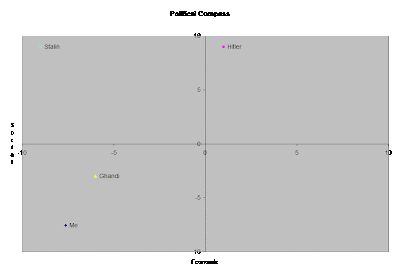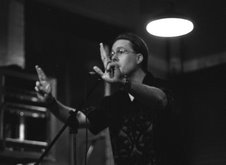For some reason, the graph does not display as a gif, so I have to reproduce it here differently:
My score:
Your political compass
Economic: Left/Right: -7.63
Your political compass
Economic: Left/Right: -7.63
Social: Libertarian/Authoritarian: -7.54
Where economic scores are negative on the left and positive on the right, and social scores are negative for libertarian and positive for authoritarian.
As a grad student, I am sure I am below the radar of the College Republicans, or else I might make their Wall of Shame, as our colleague has. (See Western Herald article below.)
I am interested in an instructor's positioning in the classroom. I think most people would advocate for instructor neutrality in the classroom. A teacher is in a position of power and students might feel the need to mirror his politics. While I agree that teachers should not be in the business of creating political clones (something the Right wing fears is happening in American universities), I am not convinced that teachers should remain neutral.
Like it or not, classrooms are public spheres and as such, they are charged with the same politics as the world outside. Teacher neutrality is the same as complicity in the hegemonic status quo. Is it not then the duty of instructors to ensure that alternative viewpoints are heard?
In the literature class I am teaching, I am hoping the alternative viewpoints can be found in the texts I select: Persepolis: The Story of a Childhood; Mules and Men; I, Rigoberta: An Indian Woman in Guatemala. These are not my voices, but they are voices outside of the hegemonic power structure. They are voices that students need to hear.
Ultimately, I want my students to gain the ability to think critically, to analyze the world around them. This can be a painful process, especially when their belief systems are similar to the institutions they are analyzing. With pain comes anger. That anger is often misdirected.
I can deal with that, even if that earns me a spot on the Wall of Shame.



No comments:
Post a Comment